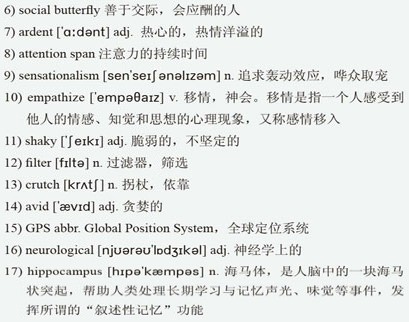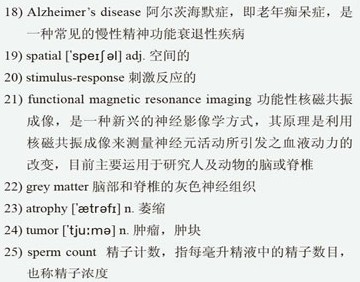Cell Phone Radiation May Damage DNA
手机辐射可能损害DNA
The debate about cell phones causing brain cancer and damaging DNA has been an ongoing issue and it's quite difficult to know where to stand. On the one hand, you have a four-country study which took place in Denmark, Finland, Norway and Sweden, which found no increase in brain 24)tumor diagnoses from 1998 to 2003. But then new research presented by Devra Davis, the founding director of the Toxicology and Environmental Studies board at the U.S. National Academy of Sciences, claims the most popular gadget of our time has been shown to damage DNA, break down the brain's defenses, and reduce 25)sperm count while increasing memory loss, the risk of Alzheimer's disease, and cancer. Davis warns that the growing brains of children make them especially vulnerable.
人们对手机能致脑癌和损害DNA的问题热议不断,那些或支持或反对的声音叫人莫衷一是。一方面,在丹麦、芬兰、挪威和瑞典四国进行的一项调查发现1998年到2003年间脑瘤病例并无增长。但美国国家科学院毒物学及环境研究中心的创办人及主管黛芙拉·戴维斯,则在其最新研究中发现:这个当今最流行的小玩意会损害DNA、破坏大脑的防御能力、减少精子计数,同时还会加速记忆丧失、 加大患阿尔茨海默症(老人痴呆症)和癌症的风险。戴维斯还发出警告:儿童正在发育的大脑特别容易受到伤害。
While I'm not sure I am going to completely jump on board with this theory, I do think it's better to be safe than sorry. Although short-term exposure is almost26)unanimously agreed to be quite harmless, long-term cell phone use tells a different story. Three studies since 1999 indicate that people who have used cell phones for more than a decade may have as much as three times greater risk of developing brain tumors on the side of the head which they most often hold their phone.
虽然我不知道自己是不是该马上认同这种理论,但我想防范于未然还是好的。尽管大家都认同短时间使用手机不会带来什么危害,但长期使用却另当别论了。有三项研究表明:自1999年以来,使用手机并长达十年的人,经常听话筒的那边大脑患脑瘤的几率有三倍之高。
Information Overload and Multitasking
超负荷的信息量与多重任务
I work in computers and was unsurprised to find out that computer users at work change windows, check e-mails or other programs nearly 37 times an hour. A study from the University of California claims that we last, on average three minutes at work before something interrupts us. Again, something I can attest to first-hand.
我是用电脑工作的,所以对电脑使用者以高达每小时37次的频率切换窗口、查电子邮件以及切换程序的行为见怪不怪。加利福尼亚大学的研究告诉我们:平均每三分钟我们的工作就会受到干扰。又一次,我本人也能亲自作证。
Scientists say 27)juggling e-mail, phone calls and other incoming information can change how people think and behave. They say our ability to focus is being 28)undermined by bursts of information. While many people say multitasking makes them more productive, research shows that heavy multitaskers actually have more trouble focusing and shutting out irrelevant information, and experience more stress. Even after the multitasking ends, fractured thinking and lack of focus persist.
科学家说兼顾处理邮件、电话以及其他涌入的信息,会改变人们的思维和行为方式;信息爆炸正损害着我们集中精神的能力。正当许多人都说多重任务能提高工作效率的同时,研究却发现沉重的多重任务其实会使人难以集中精神及排除无关信息,压力增大。即使在任务完成后,思维断续、无法集中精神的状况也会持续。






